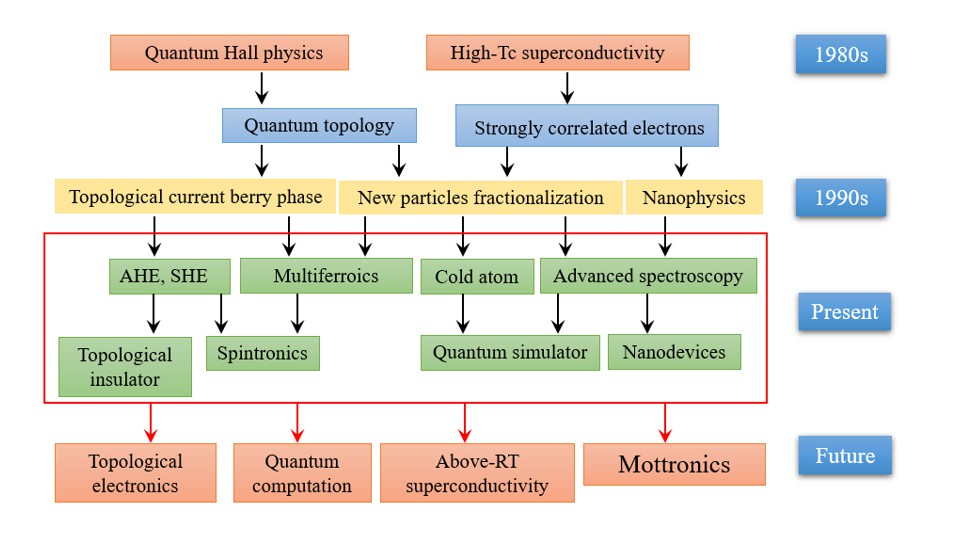Materials Development Towards an Energy-efficient Spintronic Logic Device

Author(s)
Po-Hsin HuangBiography
Po-Hsin Huang, Assistant Researcher, Science and Technology Policy Research and Information Center, National Applied Research Laboratories (Corresponding Author email: phhuang@narlabs.org.tw)
Academy/University/Organization
National Applied Research Laboratories-
TAGS
-
Share this article
You are free to share this article under the Attribution 4.0 International license
- ENGINEERING & TECHNOLOGIES
- Text & Image
- December 18,2021
Quantum technology is an emerging field in science and technology based on the physical characteristics of quantum superposition and entanglement, and it’s a critical technology where many governments pour in a huge amount of resources. The quantum concept was proposed by German physicist Max Planck in 1900 (Heilbron, 1987). Later, with the efforts of scientists such as Albert Einstein, the principles of quantum mechanics were revealed. This was the First Quantum Revolution. Moreover, the application of quantum mechanics to the field of science and technology contributes to the invention of new technological products such as chips and integrated circuits, and drives the development of semiconductor and optoelectronic industries (Chen, 2017). After the 1980s, scientists proposed to combine information theories with quantum mechanics principles, which led to the Second Quantum Revolution. It is not only a quantum revolution in scientific theory, but also an innovative application of quantum technology to the industry. By applying the principles of quantum mechanics to enhance the effectiveness of traditional tools or technologies, or even develop new technologies (Dowling & Milburn, 2003), people’s lives are expected to be transformed in the future.
Development and Application of the Quantum Technology
The variety of quantum technologies is growing fast, including quantum computing, quantum communication, post-quantum cryptography, quantum materials, quantum accelerators, quantum components, quantum information science, quantum simulation, and so on (Peterssen, 2020; iKnow, 2021). While Taiwan is a well-known manufacturing hub for ICT and semiconductor industries, we are still under restraint in terms of limited resources. Given this restraint, this article will focus on the development and applications of quantum computers, quantum communications, quantum sensing, and quantum materials that are more beneficial for Taiwan (Cyu, 2020; Chen,2020;Wang & Cehn, 2021).
In response to the miniaturization of semiconductors and the limits of Moore’s Law, scientists are actively looking for the next generation of computers. The quantum computer is based on quantum’s physical characteristics and its computing speed is faster than current computers and supercomputers. Currently, there is already much research on quantum computers and quantum algorithm simulation (Jones et al., 2012; Reynolds, M., 2017; Juan Siliezar, 2021).
Another important field in quantum technology is quantum communication. It utilizes quantum’s physical characteristics to encrypt and transmit data. In each quantum communication, a unique "quantum channel" is established for information transmission. If the information is intercepted or detected, the communication will fail immediately. Therefore, quantum communication can block eavesdropping and cracking effectively, and reduce network attacks (Gisin et al., 2002; Scarani et al, 2009). In addition, quantum computers are expected to be able to crack the existing public key encrypted system in a very short time. Thus, many countries actively invest in the development of quantum cryptography, such as the development of Quantum Key Distribution (QKD) (Scarani et al., 2009). QKD enables the two parties to use the quantum state to produce a shared secret key known only to them, which could be used to encrypt and decrypt the messages. When any third party attempts to eavesdrop on the communication, the quantum state would change and the communicating parties will abandon the communication immediately. Therefore, quantum communication is absolutely a secure way for communication (European Quantum Flagship, 2021).
Recently, research on quantum sensing has become a hot topic in academia. It’s because quantum’s physical characteristics are suitable for high precision and sensitivity sensing (Layden & Cappellaro, 2018). Therefore, some industries and research institutions predict that quantum sensing will be commercialized earlier than quantum computers. Moreover, quantum sensing can be applied in various situations, such as in navigation, prospecting, environmental monitoring, medical treatment, civil engineering, and so on (Lai, 2020).
Quantum materials have been developing since the 1980s. It covers all materials that cannot be described in terms of classical particles and low-level quantum mechanics, and contains the quantum Hall effect or superconductivity, topological insulators, quantum spin liquids, qubits, quantum sensors, or quantum dot materials (Robert et al., 2021). Figure 1 shows the brief history and future of the development of quantum materials.

Figure 1. Brief History and Future of the Development of Quantum Materials (Tokura et al., 2017)
Quantum technology would change people's lives. Because of super high-speed computing capabilities, quantum computer will change people's lives radically, and transform the current business models, especially in the manufacturing, financial, transportation, and pharmaceutical industries. In addition, quantum computing would provide the most powerful computing environment for the Metaverse and Artificial Intelligence. In terms of quantum communication, as quantum key technology will create the most secure environment, people’s privacy and social stability can be assured. Moreover, quantum sensing will realize the innovation of materials, semiconductors, equipment manufacturing, and other technologies. And in the field of biomedicine, the application of high-resolution and high-sensitivity quantum sensors would assist scientists and medical researchers to enhance the effectiveness and correctness of diagnostic, medical, monitoring, and pharmaceutical methods. Furthermore, quantum materials would become the basic material for the various fields and industries, including communications, semiconductors, or emerging technologies. In addition, quantum technology would assist scientists to further explore the microcosmic world, deep sea and space. To sum up, it could promote the development of cutting-edge technologies for social, economic, and people’s livelihoods in the world. So, the future world with quantum will be full of infinite possibilities.
Development Status of Quantum Technology in Taiwan
In Taiwan, research and development of quantum technology started in the universities and research institutions. Since 2018, quantum technology has been promoted and funded by the Ministry of Science and Technology (MOST), R.O.C. In collaboration with the industry, academia and research institutions, MOST promotes the development of quantum technology and cultivates talents with the Quantum Computer Program. So far, some progress has been made in the development of the qubit and quantum communication, including the controlling the state of spin qubits (Emma stein, 2020), and quantum communication in a 3.44 km outdoor optical fiber network by utilizing the photon quantum (MOST, 2019; Jiang, 2019). In addition, in 2020, MOST, the Academia Sinica, and the Ministry of Education formed a task force for the development of quantum technology in a five-year term. They announced an investment of NT$8 billion on quantum devices, quantum computers, quantum algorithms, and quantum communication technologies. Moreover, the government established the quantum base at Shalun, Tainan, for international cooperation and talent nurturing. In the industry, the Taiwan Semiconductor Manufacturing Company (TSMC) has been collaborating with the industry, academia, and research institutions in Taiwan and abroad to develop quantum technology. The Foxconn Technology Group established the Hon Hai Research Institute in June 2020, which focuses on the development of quantum technology, recruiting domestic and international quantum technology experts, promoting the exploration, research and development, and cultivating talents of quantum technology (Cheng, 2020).
Conclusion
Quantum technologies are a focus of investment in many countries. Taiwan needs to invest more resources and cultivate talents in this field. Although Taiwan has advantages in the information and communication technology (ICT) and semiconductor industry, it does not have as many resources as some large countries do. Given the restraint, Taiwan should cooperate with the other countries by attracting international industries and talents to keep up with other leading countries in the development of quantum technologies. The purpose is to maintain Taiwan’s leading status in the development of the ICT, next-generation chip, and semiconductor industry with the development of quantum technologies.
References
- Heilbron, J. L. (1987). The dilemmas of an upright man: Max Planck as spokesman for German science. Univ of California Press.
- Chen W. R., (2017). The second quantum revolution, Research Portal, DOI: 10.6916/STPIRP.2017-01-18。
- Dowling, J. P., & Milburn, G. J. (2003). Quantum technology: the second quantum revolution. Philosophical Transactions of the Royal Society of London. Series A: Mathematical, Physical and Engineering Sciences, 361(1809), 1655-1674.
- Peterssen, G. (2020). Quantum Technology Impact: The Necessary Workforce for Developing Quantum Software. In QANSWER (pp. 6-22).
- iKnow (2021). The quantum science and technology policy budget of 16 major countries exceeds US$24.6 billion, Retrieve from https://iknow.stpi.narl.org.tw/Post/Read.aspx?PostID=17799.
- Cyu J. J., (2020). Quantum technology is true or false, where is the development direction of Taiwan? Retrieve from https://www.digitimes.com.tw/iot/article.asp?cat=158&cat1=20&cat2=&id=600321.
- Chen J.Y., (2020). The Quantum National Team is established! Investing 8 billion yuan in five years to build a "quantum center" in Sharon, what other advanced deployments are there? Retrieve from https://www.bnext.com.tw/article/60389/gov-quantum-taiwan.
- Wang Z.Y., & Chen C.D., (2021). Where is the development of quantum computers in Taiwan? ---Quantum Generation Industry-University Layout. United News Network. Retrieve from https://udn.com/news/story/6883/5862800.
- Jones, N. C., Van Meter, R., Fowler, A. G., McMahon, P. L., Kim, J., Ladd, T. D., & Yamamoto, Y. (2012). Layered architecture for quantum computing. Physical Review X, 2(3), 031007.
- Reynolds, M. (2017). Quantum simulator with 51 qubits is largest ever. NewScientist, July.
- Juan Siliezar (2021), Harvard-led physicists take big step in race to quantum computing, The Harvard Gazette, Retrieve from https://news.harvard.edu/gazette/story/2021/07/harvard-led-physicists-create-256-qubit-programmable-quantum-simulator/
- Gisin, N., Ribordy, G., Tittel, W., & Zbinden, H. (2002). Quantum cryptography. Reviews of modern physics, 74(1), 145.
- Scarani, V., Bechmann-Pasquinucci, H., Cerf, N. J., Dušek, M., Lütkenhaus, N., & Peev, M. (2009). The security of practical quantum key distribution. Reviews of modern physics, 81(3), 1301.
- European Quantum Flagship (2021). Quantum Key Distribution (QKD), Retrieve from https://qt.eu/discover-quantum/underlying-principles/quantum-key-distribution-qkd/ on 2021/10/01
- Layden, D., & Cappellaro, P. (2018). Spatial noise filtering through error correction for quantum sensing. npj Quantum Information, 4(1), 1-6.
- Lai Z.Y., (2020). Introduction to the U.S. DARPA Quantum Sensing Technology R&D Program Research Portal. Retrieve from https://portal.stpi.narl.org.tw/index?p=article&id=4b1141ea74d7dcc40174f6316f542a66
- Robert Cava, Nathalie de Leon, & Weiwei Xie (2021), Introduction: Quantum Materials, Chemical Reviews.
- Tokura, Y., Kawasaki, M., & Nagaosa, N. (2017). Emergent functions of quantum materials. Nature Physics, 13(11), 1056-1068.
- Emma stein (2020). To catch up with global quantum technology, Taiwan’s dominant strategy can be placed on silicon-based qubits. TechNews. Retrieve from https://technews.tw/2020/11/03/quantum-computer-esr/
- Ministry of Science and Technology (MOST), R.O.C (2019). Taiwan Quantum Encrypted Communication Network Professor of National Tsing Hua University successfully developed "quantum encryption" against "quantum hackers". Retrieve from http://phys.site.nthu.edu.tw/p/406-1335-168273,r3567.php?Lang=zh-tw
- Jian, H.R., (2019). New breakthrough in quantum technology! National Tsing Hua University develops faster and longer distance quantum encryption technology. Liberty Time Net. Retrieve from https://news.ltn.com.tw/news/life/breakingnews/2990186
- Ministry of Science and Technology (MOST), R.O.C (2020). Towards a new generation of quantum in Taiwan. Department of Natural Sciences and Sustainable Research and Development. Retrieve from https://www.most.gov.tw/folksonomy/detail/2a4f3f5c-9d6e-4f8c-9ad1-b98eb95e45f6?l=ch
- Cheng S.F., (2020). Hon Hai Research Institute announced the establishment of F3.0 transformation and upgrading in full swing! Commercial Times. Retrieve from https://ctee.com.tw/livenews/aj/ctee/A79455002020061710512145
STAY CONNECTED. SUBSCRIBE TO OUR NEWSLETTER.
Add your information below to receive daily updates.




